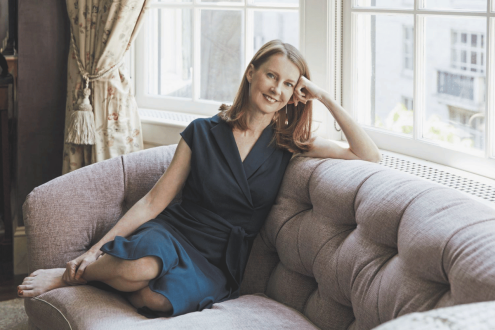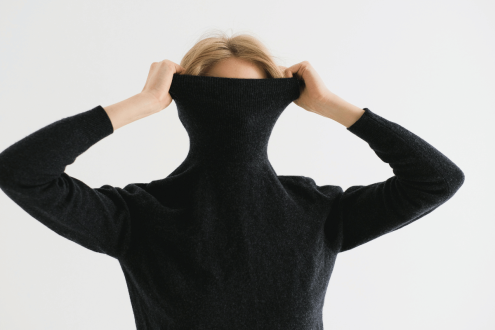How to stop spending money, and instead spend time
Many of us say we want to live a less materialistic life, where we prioritise relationships and time over things. So why is it so hard to achieve? Celia Jarvis finds out

Saturday, 3pm, and despite my aching muscles and the mosquitoes buzzing around my head, I am exhilarated. I’ve just completed a 10-mile hike through Nigeria’s unspoilt countryside.
Contrary to the images often shown on the news, Nigeria is a beautiful country. The red dusty towns of the north are dramatic, the lush greens of the south are tropical, and the amazing weather creates an abundance of fresh food. For two years, I was lucky enough to work as an English teacher in its remote northern villages.
Initially, I moved to Nigeria with only two suitcases and fully intended to have the rest of my possessions shipped over. But as the weeks went on, I found I was getting on without them. In fact, I felt an unmistakable physical lightness having freed myself from the clutter.
Community spirit
Due to the poverty in many parts of northern Nigeria, my new colleagues also lived minimally. They didn’t have the money to slavishly follow fashion, yet they always managed to look beautifully put together in traditional clothes. For the first time in my life, I could see that wealth had absolutely no bearing on style.
They also prioritised quality time with family and friends, creating a close and warm-hearted community to which I was immediately drawn. Within weeks, I had been welcomed into family celebrations, where I learned to cook goat stew and dance. This feeling of connection brought into sharp focus the amount of time I had previously wasted traipsing around shopping centres.
Removed from the lure of the shops and inspired by my Nigerian neighbours, I decided that shopping was an emotional dead end. I wanted to learn how to stop spending money on unnecessary things. I was ready to give it up. The benefits of my decision ran deep. The money I would have spent on shopping trips was used to explore Nigeria. I look back on those years and remember dozens of amazing experiences and meaningful moments: climbing Chappal Waddi mountain, swimming under the Gurara falls, and intimate dinners with friends under warm skies with a feeling of contentment and belonging throughout it all.
Breaking the habit
It took me by surprise how little I missed shopping once I was out of temptation’s way. From the age of 16 when I first started earning my own money, I have loved spending it. I bought make-up, clothes and shoes – anything to give me an instant boost. And it seems I’m not alone. A study by Groupon found that the average woman spends £33,000 in her lifetime on creams and cosmetics for her face. Yet books about mindful living regularly top the bestsellers’ lists. What’s going on here? Why do we claim we want less, but it impossible to resist the lure of spending?
When my time in Nigeria came to an end and I was due to return to Britain, I promised I would never revert to my old spendthrift ways and would use my money for new experiences and making memories. But, after only a few weeks, my resolve began to waiver. It quickly became clear that I was emotionally less well off. My support network of friends in Nigeria were thousands of miles away, and the grey winter months left me feeling flat. Understandably, while I’d been in Nigeria, my UK friends had moved on with their lives – so, with more time on my hands and without friends or hobbies to shore me up, I fell back on shopping as a way to self-soothe.
‘One of the first things I recommend people do is find a way to handle their moods that doesn’t mean spending money,’ says mindful living expert and author of Midlands Minimalist blog, Catherine Gordon. I couldn’t agree more because, in assuming I would always feel as inspired as I did in Nigeria, I had failed to find ways, aside from shopping, to deal with difficult emotions. When days came where I felt lonely, disconnected and low on self-esteem, I would head to the shops, rather than seek out a friend or go for a walk.
And so it took only a couple of months before my small set of carefully curated clothes were smothered with impulse buys. My larger wardrobe didn’t make me feel proud or glamorous – so much choice made dressing in the mornings more difficult, and was a constant reminder of my broken promise and lack of discipline.
Subliminal messages
Looking back, it’s easy to see that living in the centre of a city put me directly in the path of temptation. From the moment I left my house I was surrounded by adverts, not only imploring me to buy, but suggesting my life would be better if I spent. I was consistently encouraged to shop by a society that rewards it. On top of this, I also felt the pressure to keep up with my peers. In the small towns of Nigeria, most people didn’t have a lot of material possessions, but back in the UK, I was acutely aware of the pressure to prove that I, too, was successful.
‘Consumer culture is ingrained in us from when we’re small children. We’re encouraged to covet material things and it’s di cult to stop because it has become a habit,’ says Paul Buckley, consumer psychologist at Cardi Metropolitan University. ‘One of the ways we can tell how we are doing in life is to compare our possessions to the people around us. In psychology, we call this our associative group; they provide a benchmark of what we should be aiming for. For example, if they start buying coffee machines, then chances are we’ll nd ourselves buying one, too,’ he adds.
I realise now that keeping away from the shops isn’t a decision that’s made once, it has to be rea rmed every day. Years of conditioning through Western culture is rarely turned around quickly, and I have to monitor my thoughts constantly. Often I promise myself a shopping trip as a reward for some small achievement, before catching myself and changing it to an afternoon spent with my niece and nephew. Perhaps less glamorous, but far more enjoyable.
For me, the biggest realisation in my bid to stop shopping is that I must be attentive to my own needs. Shopping is not self-care. Although it’s fun and sometimes satisfying, it cannot give the feeling of connection provided by honest conversations with close friends. Nor does purchasing a lipstick boost my confidence like setting and achieving personal goals. Shopping can only ever be a short-term boost, a sugary high that can’t last – it is forging relationships, cultivating connections and finding meaning that’s the real soul food.
Photograph: iStock









